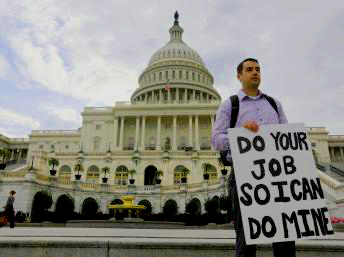
| Monday, October 07, 2013 | Archives | Advertise | Online Buyer's Guide |
Government Shutdown Could Sink Economy?
 The United States government is now deep into a partial shutdown, due to the inability of Congress to pass a Continuing Resolution to fund the government’s day-to-day operations. As is well known by now, that fight is driven by the tenacious efforts of a minority of so-called "cast-iron conservatives" within the House GOP caucus who are determined to roll back or at least rewrite parts of President Obama’s signature Patient Protection and Affordable Care Act (ACA). The United States government is now deep into a partial shutdown, due to the inability of Congress to pass a Continuing Resolution to fund the government’s day-to-day operations. As is well known by now, that fight is driven by the tenacious efforts of a minority of so-called "cast-iron conservatives" within the House GOP caucus who are determined to roll back or at least rewrite parts of President Obama’s signature Patient Protection and Affordable Care Act (ACA).But where the winner-take-all power politics now playing out inside the Beltway may ultimately land the nation’s economy should be seen as the ultimate concern of all Americans. At least as far as the federal regulation of trucking is concerned, it’s business as usual. For now , anyhow. According to the Department of Transportation’s (DOT) 2014 Plan for Appropriation Lapse, which was updated on Sept. 27, the Federal Motor Carrier Safety Administration (FMCSA) and the Federal Highway Administration (FHWA) will remain operational during the government shutdown as both agencies "have sufficient balances of liquidating cash to operate for a limited period during a lapse of annual appropriations." The plan states that "All operations continue as normal during a lapse in annual appropriations." DOT specified that none of the FMCSA’s 1,102 employees or the FHWA’s 2,914 employees will be furloughed. But that may change if the shutdown drags on too long. "Once available liquidating cash is exhausted to support continuing operations," the plan notes regarding FMCSA, "an agency shutdown may need to be implemented. For a brief funding lapse, this is not anticipated." As these agencies are funded by the Highway Trust Fund via multi-year spending bills, they are not dependent on annual Congressional appropriations. And that brings to mind what may happen with the next surface-transportation funding reauthorization. Although the current MAP-21 highway funding bill won’t run out for another 364 days, it’s hard to imagine given the current intensely partisan climate that the atmosphere on Capitol Hill will clear enough by then to allow its replacement measure to move swiftly through the legislative process. That much will change by then in Congress is doubtful, given the government has been shut down for the first time in 17 years and that the mid-term elections won’t take place for another 34 days after a new highway bill is due for passage Of far bigger and nearly immediate concern is whether or not a deal will be reached between the White House, the Democratic-controlled Senate, and the Republican-controlled House over raising the nation’s debt ceiling limit. If that doesn’t happen by October 17, the United States government will for the first time ever go into default. If that comes to pass, the immense ripple effects alone would likely send the U.S. economy, if not the world’s as well, into a very deep recession. |
 |
NAFA Fleet Management Association 125 Village Blvd., Suite 200 Princeton, NJ 08540 Telephone: 609.720.0882 Fax: 609.452.8004 |








